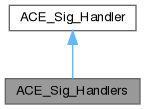This is an alternative signal handling dispatcher for ACE. It allows a list of signal handlers to be registered for each signal. It also makes SA_RESTART the default mode. More...
#include <Sig_Handler.h>


Public Member Functions | |
| ACE_Sig_Handlers () | |
| Default constructor. | |
| int | register_handler (int signum, ACE_Event_Handler *new_sh, ACE_Sig_Action *new_disp=0, ACE_Event_Handler **old_sh=0, ACE_Sig_Action *old_disp=0) override |
| int | remove_handler (int signum, ACE_Sig_Action *new_disp=0, ACE_Sig_Action *old_disp=0, int sigkey=-1) override |
| ACE_Event_Handler * | handler (int signum) override |
| ACE_Event_Handler * | handler (int signum, ACE_Event_Handler *) override |
| void | dump () const |
| Dump the state of an object. | |
 Public Member Functions inherited from ACE_Sig_Handler Public Member Functions inherited from ACE_Sig_Handler | |
| ACE_Sig_Handler () | |
| Default constructor. | |
| virtual | ~ACE_Sig_Handler () |
| Destructor. | |
| void | dump () const |
| Dump the state of an object. | |
Static Public Member Functions | |
| static void | dispatch (int signum, siginfo_t *, ucontext_t *) |
 Static Public Member Functions inherited from ACE_Sig_Handler Static Public Member Functions inherited from ACE_Sig_Handler | |
| static int | sig_pending () |
| True if there is a pending signal. | |
| static void | sig_pending (int) |
| Reset the value of sig_pending_ so that no signal is pending. | |
| static void | dispatch (int, siginfo_t *, ucontext_t *) |
Public Attributes | |
| ACE_ALLOC_HOOK_DECLARE | |
| Declare the dynamic allocation hooks. | |
 Public Attributes inherited from ACE_Sig_Handler Public Attributes inherited from ACE_Sig_Handler | |
| ACE_ALLOC_HOOK_DECLARE | |
| Declare the dynamic allocation hooks. | |
Static Private Attributes | |
| static int | sigkey_ = 0 |
| static bool | third_party_sig_handler_ = false |
Additional Inherited Members | |
 Static Protected Member Functions inherited from ACE_Sig_Handler Static Protected Member Functions inherited from ACE_Sig_Handler | |
| static ACE_Event_Handler * | handler_i (int signum, ACE_Event_Handler *) |
| static int | register_handler_i (int signum, ACE_Event_Handler *new_sh, ACE_Sig_Action *new_disp=nullptr, ACE_Event_Handler **old_sh=nullptr, ACE_Sig_Action *old_disp=nullptr) |
| static int | remove_handler_i (int signum, ACE_Sig_Action *new_disp=nullptr, ACE_Sig_Action *old_disp=nullptr, int sigkey=-1) |
| static int | in_range (int signum) |
| Check whether the SIGNUM is within the legal range of signals. | |
 Static Protected Attributes inherited from ACE_Sig_Handler Static Protected Attributes inherited from ACE_Sig_Handler | |
| static sig_atomic_t | sig_pending_ = 0 |
| Keeps track of whether a signal is pending. | |
Detailed Description
This is an alternative signal handling dispatcher for ACE. It allows a list of signal handlers to be registered for each signal. It also makes SA_RESTART the default mode.
Using this class a program can register one or more ACE_Event_Handler with the ACE_Sig_Handler in order to handle a designated signum. When a signal occurs that corresponds to this signum, the handle_signal() methods of all the registered ACE_Event_Handlers are invoked automatically.
Constructor & Destructor Documentation
◆ ACE_Sig_Handlers()
| ACE_Sig_Handlers::ACE_Sig_Handlers | ( | ) |
Default constructor.
Member Function Documentation
◆ dispatch()
|
static |
Callback routine registered with sigaction(2) that dispatches the handle_signal() method of all the pre-registered ACE_Event_Handlers for signum
Master dispatcher function that gets called by a signal handler and dispatches all the handlers...
◆ dump()
| void ACE_Sig_Handlers::dump | ( | ) | const |
Dump the state of an object.
◆ handler() [1/2]
|
overridevirtual |
Return the head of the list of ACE_Sig_Handlers associated with signum.
Return the first item in the list of handlers. Note that this will trivially provide the same behavior as the ACE_Sig_Handler version if there is only 1 handler registered!
Reimplemented from ACE_Sig_Handler.
◆ handler() [2/2]
|
overridevirtual |
Set a new ACE_Event_Handler that is associated with signum at the head of the list of signals. Return the existing handler that was at the head.
The following is a strange bit of logic that tries to give the same semantics as what happens in ACE_Sig_Handler when we replace the current signal handler with a new one. Note that if there is only one signal handler the behavior will be identical. If there is more than one handler then things get weird...
Reimplemented from ACE_Sig_Handler.
◆ register_handler()
|
overridevirtual |
Add a new ACE_Event_Handler and a new sigaction associated with signum. Passes back the existing ACE_Event_Handler and its sigaction if pointers are non-zero. Returns -1 on failure and a sigkey that is >= 0 on success.
This is the method that does all the dirty work... The basic structure of this method was devised by Detlef Becker.
Reimplemented from ACE_Sig_Handler.
◆ remove_handler()
|
overridevirtual |
Remove an ACE_Event_Handler currently associated with signum. We remove the handler if (1) its sigkey> matches the sigkey passed as a parameter or (2) if we've been told to remove all the handlers, i.e., sigkey == -1. If a new disposition is given it is installed and the previous disposition is returned (if desired by the caller). Returns 0 on success and -1 if signum is invalid.
Remove the ACE_Event_Handler currently associated with signum. Install the new disposition (if given) and return the previous disposition (if desired by the caller). Returns 0 on success and
Reimplemented from ACE_Sig_Handler.
Member Data Documentation
◆ ACE_ALLOC_HOOK_DECLARE
| ACE_Sig_Handlers::ACE_ALLOC_HOOK_DECLARE |
Declare the dynamic allocation hooks.
◆ sigkey_
|
staticprivate |
Keeps track of the id that uniquely identifies each registered signal handler. This id can be used to cancel a timer via the remove_handler() method.
Keeps track of the id that uniquely identifies each registered signal handler. This id can be used to cancel a timer via the <remove_handler> method.
◆ third_party_sig_handler_
If this is true then a 3rd party library has registered a handler...
The documentation for this class was generated from the following files: